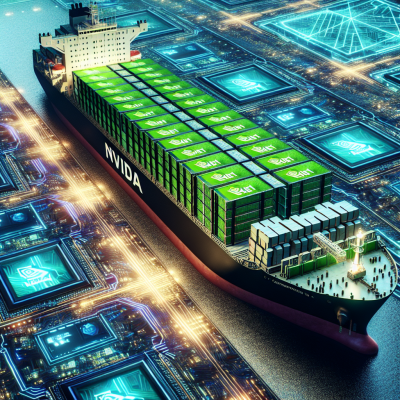
U.S. Considers Greenlighting Major UAE Purchase of Nvidia AI Chips
In a potentially groundbreaking international technology agreement, the United States is reportedly weighing the possibility of allowing the United Arab Emirates (UAE) to purchase over a million of Nvidia’s high-powered AI chips. The deal, which is still in negotiations and subject to change, would enable the UAE to import 500,000 of these advanced chips annually through 2027, signaling a major step for both global AI development and U.S. foreign trade policy.
Why the Deal Is Significant
The chips in question are the most sophisticated products in Nvidia’s portfolio—hardware that powers large-scale AI applications, machine learning tools, and complex neural networks. These chips form the backbone of infrastructure for everything from chatbots and facial recognition systems to autonomous driving and national defense simulations.
This proposed deal is more than just a sale—it’s a strategic decision that could impact global AI leadership, diplomacy, and technology security.
The Growing Demand for AI Computing Power
As an oil-rich nation with ambitious plans to diversify its economy, the UAE has increasingly turned towards technology. Over the past decade, it has invested heavily in creating a knowledge-based economy, launching AI initiatives and digital governance platforms.
With global competition for artificial intelligence supremacy heating up, the UAE’s desire to import Nvidia’s cutting-edge GPUs shows its intent to become a regional powerhouse in AI capabilities.
- AI as National Strategy: The UAE appointed the world’s first Minister of State for Artificial Intelligence in 2017.
- Strategic Vision 2031: Their long-term blueprint includes robotics, autonomous systems, and smart cities.
- Academia and Private Sector: The country has launched AI research centers and partnered with global tech firms to drive innovation.
The Role of Nvidia in Global AI Infrastructure
Nvidia dominates the high-end chip market with its powerful GPUs like the H100 and A100 series tailored for AI workloads. These chips are in high demand by nations looking to build large-model capabilities like GPT-4 and image-generating AI systems such as DALL·E and MidJourney.
With the U.S. maintaining tight export controls on AI chip technology—especially to China—this potential UAE transaction illustrates a very deliberate and selective easing of those controls, reinforcing diplomatic ties and strategic tech alliances in the Middle East.
Geopolitical Balancing Act
Exporting extremely advanced semiconductors raises key issues around national security and geopolitical influence. The U.S. government, particularly under the Biden administration, has grappled with the challenge of managing America’s technology lead without enabling adversaries to catch up.
Allowing the UAE this level of access likely means that Washington sees Abu Dhabi as a trusted partner with aligned security interests.
However, the sheer size of the deal—500,000 chips annually—and the sensitivity of the technology could still trigger scrutiny from lawmakers concerned about tech proliferation or misuse.
Key Considerations for U.S. Lawmakers and Strategists:
- Technology safeguarding: Ensuring chips are not sold to third-party actors or used for military applications outside agreed parameters.
- Export control compliance: Making sure all shipments follow guidelines established by the U.S. Department of Commerce.
- Setting precedents: Contemplating the global message this deal may send to other nations seeking similar technology access.
The Economic Implications for Nvidia and the U.S.
If approved, this deal would represent a massive revenue boost for Nvidia, which has already experienced meteoric stock growth driven by an explosion in AI and data center demand. Selling to a rich, politically stable country like the UAE provides the company with a valuable customer beyond already saturated Western markets.
For the U.S. economy, the deal could mean:
- Increased exports of high-value semiconductors
- Job creation in tech and manufacturing sectors
- Strengthened economic ties with the Gulf region
Technology Policy in the AI Race
In the rapidly evolving global AI arms race, technology policy isn’t just about innovation—it’s also about control, alliances, and influence. Approving the deal with the UAE would speak volumes about how the U.S. intends to manage its strategic chip supply diplomacy.
Moreover, AI partnerships could set the tone for future international standards in AI governance, ethics, and security frameworks.
Conclusion: A Defining Moment in AI Diplomacy
The proposed deal to allow the United Arab Emirates to purchase over one million top-tier AI chips from Nvidia is a compelling case of tech meeting geopolitics. The outcome will have implications far beyond Silicon Valley—shaping the future of global AI competition, U.S. foreign policy, and digital infrastructure in the Middle East.
As discussions continue and the policy framework evolves, all eyes will remain on Washington. Whether or not the deal goes forward, the potential to export American technology leadership—both literally and symbolically—could shape alliances and AI development trajectories for years to come.


Leave a Reply